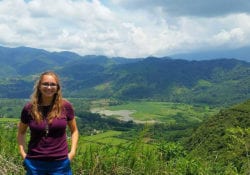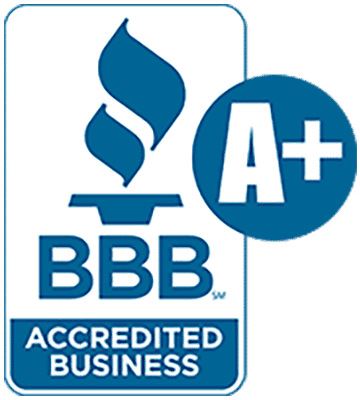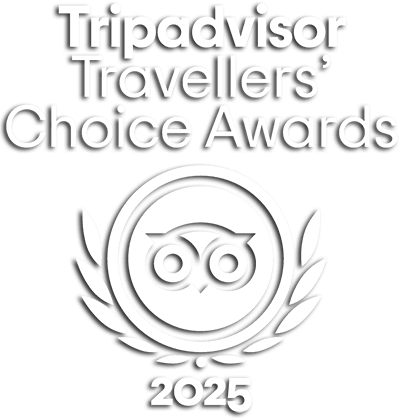Contributed by Ashley McKeown
So you just graduated from college and you’re on your way to Costa Rica to teach or work? You’re in luck! Welcome to my three-part blog: Everything You Need to Know About Moving to Costa Rica (Specifically, San Jose).
Part One: Getting Ready to Move to Costa Rica (San Jose)

Me, about one week after moving to San Jose, no idea what I was doing.
This blog post is primarily aimed at young adults thinking about moving to the Central Valley to teach English or work. I offer advice on everything from making the decision to move to packing to shopping for furniture. I moved to San Jose, Costa Rica 3 months after I graduated from college in 2016. I had a job lined up when I moved, but it’s not totally necessary. Many teachers I met took a TEFL course in Manuel Antonio/at a beach before moving to San Jose to find a job. It’s a good option, although rather expensive.
All of my advice is based on my experiences, or the experiences of friends who went through similar situations. I’ve split the blog into three parts: Getting Ready to Move to Costa Rica, Moving to Costa Rica 1 & Moving to Costa Rica 2.
Below you will find information on
- Deciding to Move to Costa Rica
- Packing
- Money/Budgeting
- Arriving in Costa Rica (Airport/Customs)
The second part of the blog includes:
- Finding an Apartment
- Using your cell phone in Costa Rica
- Helpful Spanish Phrases
- Costa Rica safety tips
The third part of the blog includes:
- Going to doctor in San Jose
- Public transportation in San Jose
- Shopping (Clothes, apartment items, groceries)
- Going out in San Jose
I had to split it into three parts not necessarily because I’m long-winded (*coughs uncomfortably*), but because I have so much information to share. I hope you find it useful as you’re preparing for your exciting move to Costa Rica!
Moving to Costa Rica: Making the Decision
There are a lot of good reasons to consider moving to Costa Rica.
- Gap year
- Internship
- To learn Spanish
- To gain teaching experience
- To gain experience living abroad
- To see a beautiful country
- To escape a bad/boring job or bad relationship
Either way, when you’re deciding whether or not Costa Rica is right for you, I would consider the following:
Pros
- It’s truly beautiful. Beaches, mountains, volcanoes and waterfalls galore. If you’re adventurous, you’ll love Costa Rica.
- It’s close to many other easily accessible countries.
- The Spanish is easy to understand, once you learn the common Tico slang.
- It’s a safe country.
- Fun nightlife culture; modern pop culture
- Pura Vida: A relaxed way of life.
Potential Cons (Based on complaints I’ve heard from foreigners who did not enjoy living in Costa Rica)
- Traffic and pollution (in San Jose)
- Low salaries (can be a pro! It’s nice to learn how to budget and live off less than you’re used to)
- Poor infrastructure
- Demanding work culture (50+ hours a week is normal)
- Pura Vida: It can be hard to adjust to. Not everything runs on time or is efficient.
I’ve met foreigners who’ve loved Costa Rica and foreigners who’ve hated it entirely. Your feelings will depend on where you’re coming from, past experiences, preferred lifestyle, open-mindedness and even pet peeves. When you’re deciding whether or not you want to make the move I would make it based on:
- Financial situation (You will not earn enough to be paying off major loans in the US/Europe, or even save money). I suggest having a strong savings account and a back up plan for emergencies.
- Your attitude: Come with a positive attitude and a determination to have a great time.
- Your flexibility: Things won’t always be what you expect or always go the way you want them to. Be flexible (pura vida, mae).
Getting Ready to Move
Packing
I’m moving to teach English, what kind of clothes should I pack?
When I moved to Costa Rica to teach I had no idea what I was doing. I ended up packing WAY too much. It was embarrassing.
First things first. Don’t pack that many clothes. You don’t need that much.
That being said, Ticos care a lot about their appearance and will look pretty nice every day. A lot of people from the US tend to assume that they can get away with teaching or working in worn out travel clothes, shorts, tank tops and flip flops. This is not the case. Pack light, but pack business casual. Also be aware that in the States we can get away with wearing gym clothes, flip flops and even pajamas out of the house. Again, not the case in San Jose. Shorts are for the beach, gym clothes are for the gym and flip flops are for the house. I am relieved to admit, however, that it IS ok to be an outfit repeater here.
I’ve put together a packing list based on my experience below. The first list is clothes for women, followed by clothes for men (a little less detailed). Further down you’ll find an “other” list and a “don’t bring” list for men and women. You should also talk to your employer about a uniform when you’re packing. Some businesses and schools require the common Tico uniform: blue or khaki pants, black shoes and the company polo shirt.
If you’re teaching or working I recommend bringing:
Clothes (for women)
- 2-5 pairs of black, blue or khaki pants.
- 5-10, lightweight, comfortable tops that you can mix and match
- 2-4 Cardigans/Sweaters (it does get chilly at night)
- Comfortable flat shoes that can get wet. (I brought heels with me—mistake. I only wore them a few times to business classes). You’re going to be walking and getting on and off buses A LOT. Wear comfortable shoes. From May-November it will rain almost every afternoon, so be prepared for that. Some people carry around rain boots/shoes and change before teaching. Not a bad idea.
- Ankle boots if you like them. Good for working and going out.
- Sandals for the beach. Flip Flops for the house.
- Whatever workout clothes you normally need.
- 1-2 pair of tennis shoes. (I run regularly, so I have one pair for running, and one pair for hiking that I don’t care about)
- Some cute outfits for going out.
- Swim-suits and beach dress/clothes. Get a comfortable dress or cover that you don’t mind getting sweaty and sandy in. It makes a huge difference!
- 1-2 formal outfits. Maybe 1.
- Rain jacket
- Warm jacket. Costa Rica is a tropical country, but it still gets cold here! San Jose can be especially chilly at night. There was one week where I wore boots, a jacket and a heavy scarf to work every day. You’ll also want a nice jacket if you go hiking in the mountains.
Overall, just bring clothes that can be used as business casual, casual and going out. For example, I use a lot of tank tops. When I’m at work I pair them with sweaters. When I’m going to bars I leave the sweaters at home.
Friendly piece of advice: ditch the long cotton skirts and chaco look. You will look so out of place. I mean, if you’re coming from Europe or North America, you’re already going to stick out. The long skirts and chacos just makes it so much worse (Ticas care a lot about fashion). And to be honest it is not a comfortable outfit for navigating the streets of San Jose. (Just one gringa’s opinion though, so take it with a grain of salt).
I brought a lot of pencil skirts and dresses when I first came. They are nice to walk in when it’s hot. You will get more attention on the street wearing them though. When I started working full-time at a business that required pants, I ditched them and never looked back.
NOTE: Many apartments and houses do NOT have dryers. Be ready to hang dry your clothes. Depending on where you live, you might only have access to laundry once a week. Plan accordingly.
Clothes (for men)
For work, just bring 1-2 weeks worth of business casual clothes and shoes that you would consider appropriate for autumn and summer time. If you’re teaching, I wouldn’t worry about ties or suit jackets. For regular classes polo shirts are fine. If you are going to be teaching business classes, you might want to bring a couple button down shirts.
Your normal beachwear and clothes for going out will work just fine.
- Exercise and hiking shoes
- Extra socks
- Extra shoes for walking in the rain
- Sandals for the beach
- Hygiene Products (Hygiene products are really expensive in Costa Rica and they don’t always have the same brands)
- Rain Jacket
- Warm Jacket
Other (Women and Men)
- Umbrella
- Two bath towels, one beach towel
- Your favorite hygiene and feminine hygiene products. STOCK UP is my advice. They are expensive here, especially if you want imported brands. I’m personally offended by how much they charge for deodorant in Costa Rica.
- Over the shoulder work bag with a zipper. You’ll be carrying books, homework, chargers, misc. other things around all day. It’s nice to have one business casual bag (that zips) that you can rely on. Invest in a nice, sturdy one. It’s worth it.
- Backpack (for traveling)
- Waterproof bag, cell phone case
- Sunscreen and bug spray. Both are unbelievably expensive in Costa Rica.
- Prescription meds and Ibprofen
Don’t bring
- Apartment items. You can find furnished apartments everywhere and anything you don’t have you can buy for cheap at my favorite store “Pequeño Mundo”
- Too many clothes. And here’s why: Not only is it a huge pain to get them here, but you’re coming to a tropical country. Items that are not used and washed regularly GET MOLDY. You can usually salvage anything by just wiping off the mold, but it’s gross. Also every foreigner I’ve met moved apartments at least once while they were here and if you don’t know a local, you’re moving in a Uber.
- Don’t worry about too many over-the-counter drugs. You can find basically everything you need at the pharmacy in Costa Rica.
LESS IS MORE. Don’t be like me and bring 3 suitcases. Your host family will judge you and looking back two years later you will also judge yourself.
Money
 Figuring out how much money to save and bring to Costa Rica is tricky. Costa Rica is an expensive country. Rent and transportation costs are relatively cheap, but everything else is as expensive or more than the US and UK. Be prepared to OVER-budget. Your expenses will also depend on how much traveling you’re going to do, if you have a job before you arrive and how cheaply you’re willing to live. You can get by relatively cheaply if you put your mind to it. However, it is a good idea to have a couple thousand dollars saved before you come. It will help you get started, pay apartment deposits, buy plane tickets for visa runs and just have more peace of mind.
Figuring out how much money to save and bring to Costa Rica is tricky. Costa Rica is an expensive country. Rent and transportation costs are relatively cheap, but everything else is as expensive or more than the US and UK. Be prepared to OVER-budget. Your expenses will also depend on how much traveling you’re going to do, if you have a job before you arrive and how cheaply you’re willing to live. You can get by relatively cheaply if you put your mind to it. However, it is a good idea to have a couple thousand dollars saved before you come. It will help you get started, pay apartment deposits, buy plane tickets for visa runs and just have more peace of mind.
How much money should I save before moving to Costa Rica?
As an absolute minimum, 1,000 USD IF you already have a job lined up. To be honest, telling you to only have $1,000 saved gives me anxiety. $2,000 would be better.
If you don’t have a job lined up and you plan on traveling right out of the gate, I would recommend $2,000-$5,000.
What immediate expenses should I anticipate when moving to Costa Rica?
Apartment deposit and 1st month’s rent.
- Apartments are about 150,000-250,000 (COLONES) a month, depending on where it is and how many roommates you’re willing to put up with.
- 150,000 colones ~ $320 (depending on how strong/weak the dollar is)
- There are many apartments and houses where you can rent a room for much cheaper, 100,000-150,000 colones ($200-$300).
- The less you pay, the less space you’ll have and the more amenities you might share (kitchen, bathroom, laundry machines).
Groceries (per week)
- This really depends on what kind of food you’re buying and where you’re buying it from. The weeks when you need to buy hygiene or cleaning products are going to be a lot more expensive.
- Really basic food from ferias (farmer’s markets) and Palí (cheapest grocery store): 15,000-20,000 ($30-$40)
- More realistic grocery budget: 20,000-35,000 ($40-$60)
Apartment Items
- Most apartments are already furnished, so you will probably only need to buy random, miscellaneous items: 25,000 colones ($50)
- Find more information about shopping for your apartment here.
Traveling Expenses
- You’re in Costa Rica! You have to travel around, otherwise why would you be here?
- Bus tickets are pretty cheap, and you can find affordable hostels or air b & b’s easily.
- Still, plan a large budget. 50,000-100,000 colones ($100-$200) per weekend trip (minimum)
Going Out
- I love going out to eat (and drink) so I budget quite a bit for going out. Eating and drinking out is expensive in Costa Rica.
- For one night out (eating and drinking at a decent bar/restaurant, not ‘fancy’):
- Food: 4,500-7,000 ($8.50-$14)
- Drinks:
- Beer: 1,500-3,000 ($3-$6)
- Cocktails: 2,500-4,000 ($5-$8)
- So, if you’re eating out and having, let’s say 4 drinks, plan on 10,500-23,000 ($21-$45)
- Drinks and shots are cheaper at bars where people go to really “go out” but it’s still expensive. If you’re cheap like me, it’s a good idea to pregame a little.
- Even if you don’t think you’ll go out that much, know that it’s one of the main forms of socialization for foreigners and Ticos alike in Costa Rica, so it can be hard to avoid when trying to make friends.
- Find more information about going out in Costa Rica here.
Transportation Costs
- Good news! Uber and bus fares are actually pretty cheap.
- Bus ride: 200-400 colones (less than a dollar)
- Average Uber: 2,500 colones ($5) for 10-15 minute ride
- Find more information about public transportation in San Jose here.
How much money should I expect to earn teaching in Costa Rica?
About $800-$1,000 per month, which is considered a pretty good wage in Costa Rica. If you’re coming from a full-time job, it probably doesn’t seem like enough. It works though, once you learn how to budget and if you have a good savings to get you started.
Budget Tips
- Make a realistic budget for yourself based on your salary, monthly costs and interests.
- Live with a roommate.
- Look for an apartment close to your job to reduce transportation costs.
- Walk and take the bus as much as possible (in safer neighborhoods). Uber is cheap, but not if you use it every day.
- Shop at the Feria (Farmer’s Market).
- Don’t buy imported food items (If you can help it).
- Avoid AMPM and Fresh Market (Popular convenient stores, but also the most expensive).
Arriving to Costa Rica
MOST IMPORTANT:
HAVE YOUR RETURN TICKET READY!
- Chances are, you’re coming to work without a visa. Welcome to the club. That means you are entering as a tourist, which means that you are only allowed to stay in the country for 90 days at a time. You must have proof that you are leaving the country within 90 days. Have a reservation ready to show the the customs official that’s around 3 months after your arrival date. You don’t want them to only give you 30 days because your fake ticket says you’re leaving in a month.
- If you don’t have a return ticket, there is a good chance they will make you buy a plane ticket on the spot. And they won’t let you shop around for the cheapest flights either. Many of my friends have left customs with $200-$800 less because they had to buy an emergency exit ticket.
- Your return ticket can be a plane ticket or a bus ticket. As long as it’s a ticket out of Costa Rica within 90 days, you should be set.
- They won’t always ask for it, but they usually do. I’ve also noticed that they are starting to be stricter about it in the US before they even print your ticket. Relax. Just say you’re going to travel or study Spanish.
- My advice: If you can find a place that is willing to sponsor your visa, jump on that opportunity. You won’t have to leave every 3 months and chances are they will treat you better as an employee.
US CITIZENS: They are getting more and more strict at US airports about US citizens coming to Costa Rica.
If you are buying a one way ticket, you are no longer allowed to check in online because the airport official has to see your return ticket. More and more the return ticket has to be back to your country of origin (from what I’ve heard, this is less common for Europeans). That means that you need a plane ticket back to your home country within 90 days.
Have your “foreseen address” ready on the plane
- You have to write it on your customs document. If you’re living at a place that has a traditional Costa Rica address (meaning it’s an apartment or a house, not a hotel or hostel), make sure you know the address before you get there.
- It’s also helpful if (and when) the airline loses your luggage. If you have the exact address and phone number, the airport will bring your luggage to your house.
Have all the contact information for whoever is picking you and/or your host family/landlord on hand
- If your plane is delayed or you get diverted to the airport in Liberia (it really sucks, and it has happened to me, but only once), you will need to get in contact with them. You life will be so much easier if you have the information easily accessible.
Download the Uber App before you arrive
- It’s a great way to get from the airport to your apartment/hostel/host house, especially if your flight is delayed.
Be ready for a line at customs
- Depending on what day of the week and what time, be ready for a loooong customs line. My technique is to walk very quickly off the plane so I can try and avoid waiting for a long time.
- If you arrive at the beginning of the week or really late at night, the line isn’t usually that bad. I’ve flown through customs in less than 5 minutes before. I’ve also waited in line for hours.
Make sure your phone is charged when you get off the plane
- If you end up in a long line, it’s nice to have music or a podcast/audio book to pass the time. The airport DOES have good wifi, so you can also contact your family and friends as soon as you land.
Do not, DO NOT, exchange money at the airport
- They rip you off. If you need to, do it at a local bank.
Don’t Stress too much!
- Unless you have airline issues, entering Costa Rica is generally very easy. If you don’t speak Spanish, no problem. Almost all the airport employees and customs officials speak English and they don’t expect you to speak Spanish.
Read our Privacy Policy - Sitemap.















Follow Us